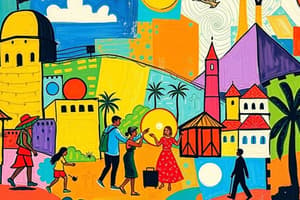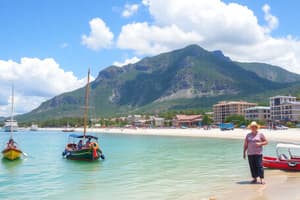Podcast
Questions and Answers
Which type of tourism specifically focuses on traveling for work-related purposes?
Which type of tourism specifically focuses on traveling for work-related purposes?
- Cultural Tourism
- Adventure Tourism
- Business Tourism (correct)
- Leisure Tourism
What is a potential negative impact of tourism on the environment?
What is a potential negative impact of tourism on the environment?
- Increased cultural understanding
- Job creation in local businesses
- Habitat destruction and pollution (correct)
- Conservation and sustainability awareness
Which of the following is a significant contributor to the global economy?
Which of the following is a significant contributor to the global economy?
- Ecotourism
- Cultural Tourism
- Tourism (correct)
- Adventure Tourism
What trend is currently observed in the tourism industry?
What trend is currently observed in the tourism industry?
Which type of tourism focuses on responsible travel to natural areas?
Which type of tourism focuses on responsible travel to natural areas?
Which of these sectors is NOT typically considered a key sector in tourism?
Which of these sectors is NOT typically considered a key sector in tourism?
What is a key challenge currently faced by the tourism industry?
What is a key challenge currently faced by the tourism industry?
Tourism management requires collaboration between which parties?
Tourism management requires collaboration between which parties?
Study Notes
Definition of Tourism
- Travel for leisure, recreation, or business purposes.
- Involves temporary movement to different locations.
Types of Tourism
- Leisure Tourism: Traveling for pleasure and relaxation.
- Business Tourism: Travel for work-related purposes, including meetings and conferences.
- Cultural Tourism: Involvement in cultural heritage and local traditions.
- Adventure Tourism: Activities that involve physical challenges, such as hiking and scuba diving.
- Ecotourism: Responsible travel to natural areas, emphasizing conservation and sustainability.
- Medical Tourism: Traveling to receive medical care or treatments.
Economic Impact
- Significant contributor to global economy.
- Job creation in hospitality, transport, and local businesses.
- Source of foreign exchange earnings for many countries.
Environmental Impact
- Can lead to habitat destruction and pollution.
- Overtourism may strain local resources and infrastructure.
- Promotes conservation and awareness when managed sustainably.
Social and Cultural Impact
- Fosters cultural exchange and understanding.
- Can lead to loss of local traditions and cultural commodification.
- May create community development opportunities.
Key Sectors
- Accommodation: Hotels, hostels, vacation rentals.
- Transportation: Airlines, car rentals, public transport.
- Food and Beverage: Restaurants, cafes, catering services.
- Attractions: Museums, parks, entertainment venues.
Trends in Tourism
- Increased focus on sustainable and responsible travel.
- Growth in digital and online travel services.
- Rise of experiential travel, where tourists seek immersive experiences.
- Use of technology for bookings and virtual tours.
Challenges in Tourism
- Economic fluctuations affecting travel patterns.
- Environmental concerns and climate change.
- Political instability and health crises (e.g., pandemics).
- Balancing tourist demand with local community needs.
Tourism Management
- Requires strategic planning and policy development.
- Involves collaboration between government, businesses, and communities.
- Focus on sustainable practices and tourist education.
Future of Tourism
- Potential for growth in niche markets (e.g., wellness, agritourism).
- Emphasis on technology (AI, VR) to enhance travel experiences.
- Increased awareness and action towards sustainability initiatives.
Definition of Tourism
- Travel encompasses leisure, recreation, or business objectives.
- Involves temporary relocation to various destinations.
Types of Tourism
- Leisure Tourism: Pursued for enjoyment and relaxation.
- Business Tourism: Focuses on work-related travel, such as attending meetings and conferences.
- Cultural Tourism: Engages with cultural heritage and local customs.
- Adventure Tourism: Involves physically demanding activities, including hiking and scuba diving.
- Ecotourism: Promotes responsible travel to natural areas, prioritizing conservation and sustainability.
- Medical Tourism: Involves traveling to access healthcare services or treatments.
Economic Impact
- Tourism significantly contributes to the global economy.
- Creates jobs in sectors like hospitality, transport, and local commerce.
- Serves as a vital source of foreign exchange for numerous countries.
Environmental Impact
- Can cause habitat destruction and contribute to pollution.
- Overtourism strains local resources and infrastructure.
- When managed sustainably, tourism can promote conservation and environmental awareness.
Social and Cultural Impact
- Encourages cultural exchange and enhances mutual understanding.
- May result in the erosion of local traditions and cultural commodification.
- Generates opportunities for community development.
Key Sectors
- Accommodation: Includes hotels, hostels, and vacation rentals.
- Transportation: Covers airlines, car rentals, and public transport systems.
- Food and Beverage: Comprises restaurants, cafes, and catering services.
- Attractions: Encompasses museums, parks, and entertainment venues.
Trends in Tourism
- Growing emphasis on sustainable and responsible travel methods.
- Increasing prevalence of digital and online travel services.
- Rise in experiential travel prioritizing immersive tourist experiences.
- Adoption of technology for booking processes and virtual tours.
Challenges in Tourism
- Economic fluctuations can alter travel patterns and preferences.
- Environmental concerns, especially related to climate change.
- Political instability and health crises can impact tourism dynamics (e.g., pandemics).
- Need to align tourist demand with local community requirements.
Tourism Management
- Requires strategic planning alongside policy development.
- Involves partnerships between governments, businesses, and local communities.
- Emphasizes sustainable practices and educational initiatives for tourists.
Future of Tourism
- Potential for growth in niche sectors, such as wellness and agritourism.
- Increasing integration of technology (AI, VR) to enhance travel experiences.
- Heightened awareness and initiatives focused on sustainability in tourism.
Studying That Suits You
Use AI to generate personalized quizzes and flashcards to suit your learning preferences.
Description
Explore the key definitions and types of tourism, including leisure, business, and cultural aspects. Understand the economic and environmental impacts that tourism has on a global scale. Test your knowledge on how tourism shapes our world.




